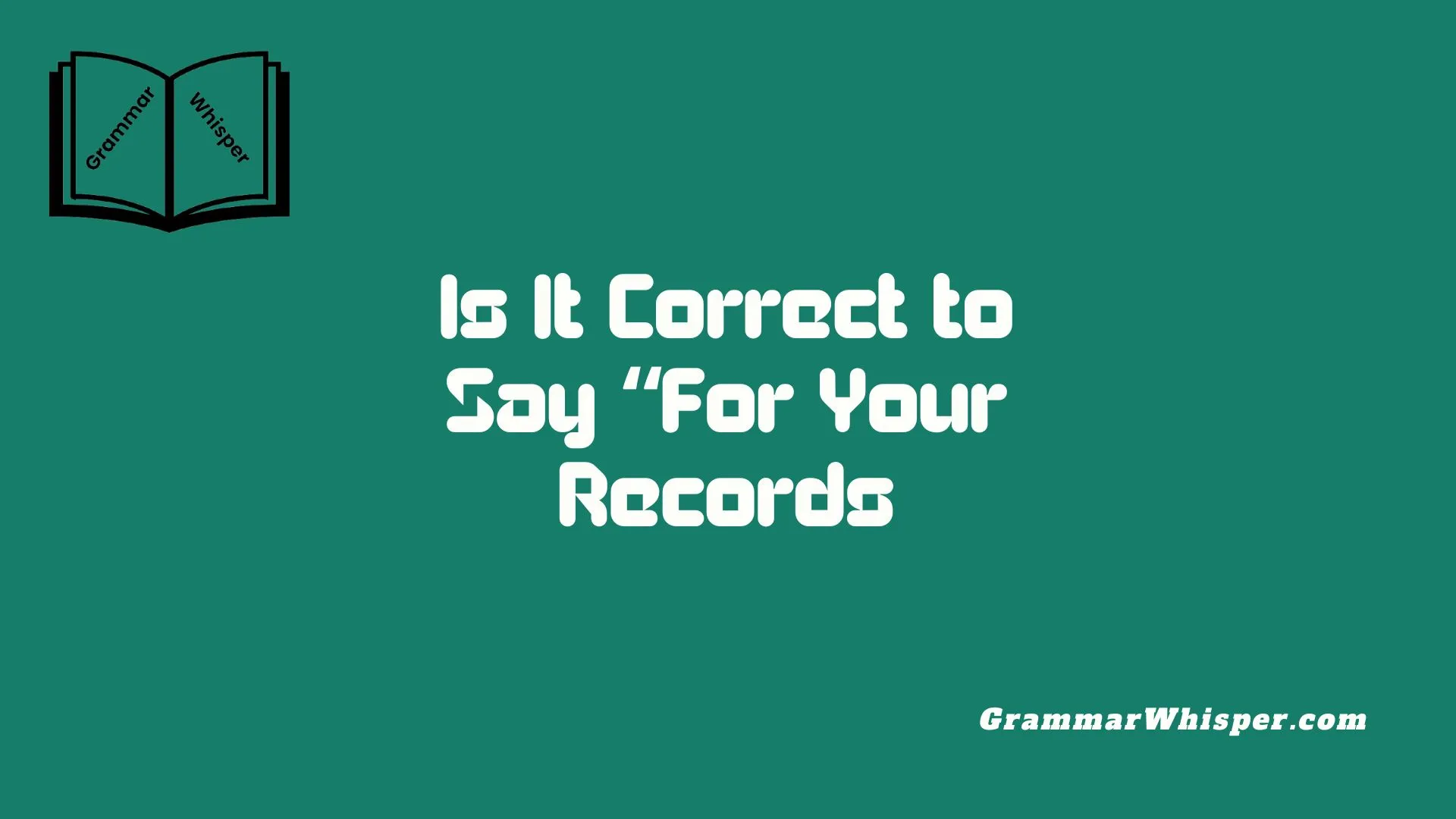In today’s digital and physical world, I constantly come across the phrase “for your records” in emails, reports, and letters. As someone who works closely with professionals fine-tuning business language, I’ve learned how this simple expression lends powerful clarity and subtle professionalism. Whether you’re involved in modern business or handling personal matters, the phrase helps indicate that the attached or included material is meant for documentation – not necessarily to prompt any action. Its real purpose is preservation. It’s like a quiet nod that says, “Hold on to this – it matters.”
Stepping into the linguistic side of things, there’s an interesting nuance between using “record” versus “records.” Both are grammatically correct, but “records” follows English tradition and mirrors current trends in formal writing. The plural form subtly implies multiple documents – perhaps forms, receipts, or other pieces of evidence. A reliable guide would stress that “for your records” is deeply grounded in long-standing usage and still offers practical value. It stands firm in both professional and casual communication, providing an authoritative tone while keeping your message clear and purposeful.
What Does “For Your Records” Actually Mean?
“For your records” is a common phrase in English used to indicate that something is being shared as a reference or official documentation. It suggests that the recipient should keep the information but doesn’t need to act on it immediately.
Practical Definition
- For: Preposition indicating purpose or use
- Your: Second-person possessive pronoun
- Records: Collection of stored information or documented items
“Here is a copy of the invoice for your records.”
This simple sentence implies that the document is for safekeeping, not for action.
Why It Matters
- Adds professional tone
- Prevents misunderstandings
- Establishes a document trail
Understanding the Difference: “Record” vs “Records”
While the phrase is often used in its plural form, it’s important to understand when the singular might also apply.
| Term | Meaning | Usage Example |
| Record | One specific documented item | “Keep this document for your record.” |
| Records | A collection or ongoing file of documents | “Please save these forms for your records.” |
The Plural Dominance
In 99% of modern usage cases, “records” is the default choice. This is because:
- People typically store more than one document.
- The context usually implies ongoing documentation.
- It sounds more natural and formal.
Singular Uses (Niche Cases)
Rarely, “record” may be appropriate:
- Referring to a single instance, e.g. “one medical record”
- In legal, archival, or database terminology
But for general communication, stick to “records”.
Is “For Your Records” Grammatically Correct?
Yes, “for your records” is completely grammatically correct. It is widely accepted in both British and American English.
Grammatical Structure
- Prepositional phrase
- Functions as a purpose modifier in sentences
- Typically placed at the end of a sentence
Correct examples:
- “I’ve attached the signed contract for your records.”
- “Enclosed are the tax forms for your records.”
Incorrect:
- “For your records I have attach.”
- Needs proper verb form: “have attached”
Tone & Style
- Formal, but not overly stiff
- Useful in both paper and electronic communication
Common Scenarios Where You Say “For Your Records”
This phrase is used in multiple real-world settings. Understanding when and how to apply it can sharpen your professional communication.
When Sending Documentation
- Contracts
- Receipts
- Invoices
- Insurance forms
“Please find the invoice attached for your records.”
In Legal and Compliance Communication
- Non-disclosure agreements
- Terms and conditions
- Regulatory filings
Education & Academia
- Transcripts
- Certification records
- Reference letters
Personal Finance or Household Management
- Bills
- Tax documents
- Warranties
Formal vs Informal Contexts: Where It Fits Best
Formal Settings
- Business emails
- HR onboarding docs
- Financial disclosures
- Medical correspondence
Informal Usage (Less Common)
- Friendly reminder emails
- Sending receipts to friends or roommates
Pro Tip: You can adapt the phrase slightly for tone. For instance:
- Formal: “This is enclosed for your records.”
- Informal: “Just in case you need this later.”
When to Use Singular “Record” – And Should You?
The singular form “record” is technically correct, but it’s rare and sounds slightly off unless the context specifically refers to a single documented item.
Examples
- “We’ve updated your profile with one vaccination record.”
- “This is the only invoice for your record.” (less natural)
Best Practice
Unless you’re dealing with a specific single entry that has already been defined, use “records.”
Analyzing Real Examples: “For Your Record” vs “For Your Records”
| Sentence | Correctness | Reason |
| “Here is the form for your record.” | ❌ Questionable | Sounds incomplete or overly specific |
| “Attached is the form for your records.” | ✅ Correct | Standard business communication |
| “We kept one copy for your record.” | ✅ Acceptable | If explicitly referencing one item |
| “This is just for your records.” | ✅ Correct | Most commonly used format |
Alternative Phrases That Can Replace “For Your Records”
Here are some useful alternatives depending on tone and context:
| Alternative Phrase | Tone | When to Use |
| For your reference | Neutral | Professional emails or memos |
| Just in case you need it | Casual | Informal or friendly communication |
| To keep on file | Formal | Legal, compliance, academic settings |
| For documentation purposes | Formal | Audits, financial records |
| Copy enclosed | Neutral | Cover letters or mailing physical docs |
Example Sentence
“I’m attaching a duplicate copy to keep on file, just in case you need it later.”
Tone, Clarity, and Purpose in Business Communication
Using clear phrases like “for your records” shows you value:
- Transparency
- Accountability
- Reader-centric messaging
Why It Matters
In legal, healthcare, or financial fields, vague communication can lead to:
- Misunderstandings
- Compliance risks
- Loss of trust
Using documentation-related language helps mitigate those issues.
“When clarity is critical, choose language that serves your reader, not just your style.”
Using “For Your Records” in Digital Communication
Digital tools like email and cloud storage have made record-keeping easier. This phrase still applies, especially when handling attachments or documentation.
Best Practices for Email
- Place “for your records” in the closing line
- Use subject lines like:
- “Invoice Attached for Your Records”
- “Statement Enclosed for Your Records”
When Sharing Files
- PDFs, scanned documents, spreadsheets
- Cloud links (Google Drive, Dropbox)
“I’ve uploaded the signed contract to Google Drive for your records.”
Mistakes to Avoid with “For Your Records”
Overuse
Using it too frequently in one email can feel robotic.
Example:
“Here’s the contract for your records. Also attached is the receipt for your records. Additionally, here is the quote for your records.”
Instead:
“Please find the contract and receipt attached for your records.”
Misplacement in Sentences
Incorrect: “For your records the file is attached.”
Correct: “The file is attached for your records.”
How “For Your Records” Varies Across Professions
| Industry | Common Documents Sent “For Your Records” |
| Legal | Contracts, agreements, court documents |
| Finance | Invoices, bank statements, transaction receipts |
| Education | Certificates, grades, attendance records |
| Healthcare | Medical history, test results, vaccination forms |
| HR/Recruiting | Offer letters, performance reviews, onboarding docs |
Each industry has its own standards, but the underlying principle is the same: help the recipient maintain a trusted and organized documentation trail.
Quick Reference Table: Usage, Meaning & Context
| Phrase | Correct? | Used In | Better Option If Needed |
| For Your Records | ✅ Yes | All formal communication | “For your reference” |
| For Your Record | ❌ Rare | Specific item only | “To keep on file” |
| Attached For Records | ❌ No | Awkward, lacks clarity | “Attached for your records” |
| Copy Enclosed | ✅ Yes | Mail or cover letters | “For documentation purposes” |
Final Thoughts
Absolutely. “For your records” is a timeless phrase that continues to play a vital role in both traditional and digital communication. When used properly, it:
- Adds clarity and professionalism
- Ensures proper documentation
- Improves organizational trust and transparency
If your goal is to maintain a paper or digital trail, this phrase is not just correct – it’s powerful. Keep using it. Just make sure you understand its tone, its correct form, and its impact.
FAQs
What does “for your records” mean?
“For your records” means that the document or information you’re receiving is intended to be kept for your future reference. It’s a polite way of saying, “You may need this later, so keep a copy.”
Is it grammatically correct to say “for your records”?
Yes, it’s absolutely grammatically correct. “Records” in this phrase refers to files, documentation, or any kind of saved information. It’s commonly used in professional, legal, and administrative settings.
Should I say “for your record” or “for your records”?
In almost all contexts, the correct phrase is “for your records” – plural. That’s because people usually keep multiple documents or types of information in their records, not just one. The singular “record” is rarely used unless you’re referring to a specific item like a medical or criminal record.
When is it appropriate to use “for your records”?
You can use “for your records” when you:
- Send receipts or invoices
- Share legal agreements
- Provide reference letters
- Send copies of signed forms
- Share any documentation that the recipient may need to store or refer back to later
It adds a layer of professionalism and clarity.
What are some alternatives to saying “for your records”?
If you want to say it differently, here are some alternatives:
- For your reference
- For safekeeping
- To keep on file
- For archival purposes
- Please retain this for future use
Each one works depending on tone and formality, but “for your records” remains one of the clearest.











